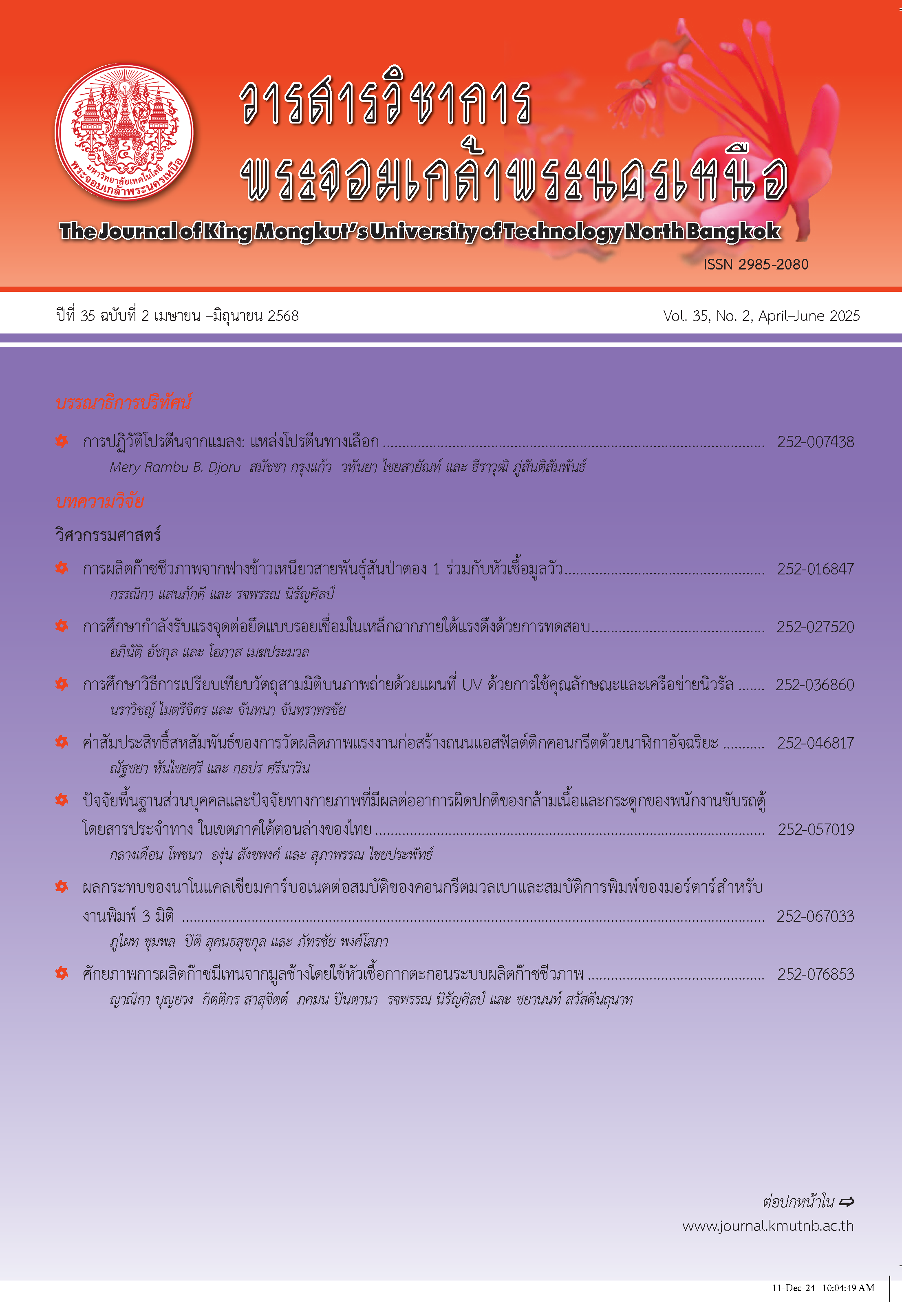การพัฒนาและประเมินหลักสูตรฝึกอบรมครูเทคนิคอาชีวศึกษาของไทยตามแนวทางการศึกษา และการฝึกอบรมด้านเทคนิคและการอาชีวศึกษาของเยอรมัน: เส้นทางสู่การแข่งขันระดับโลก
Main Article Content
บทคัดย่อ
เทคโนโลยีช่วยส่งเสริมให้เกิดการเรียนรู้ด้วยตนเองและการเรียนรู้ในรูปแบบต่าง ๆ เกิดขึ้นได้ อาชีวศึกษามีส่วนช่วยส่งเสริมกลุ่มแรงงานเฉพาะทางผ่านทางสถาบันการศึกษาต่าง ๆ ความสามารถในการแข่งขันในระดับสากลจำเป็นต้องมีการพัฒนาสมรรถนะของครูเทคนิคอาชีวศึกษา งานวิจัยนี้มีวัตถุประสงค์เพื่อจัดทำและประเมินหลักสูตรการฝึกอบรมครูเทคนิคอาชีวศึกษาตามเทคนิคการศึกษาของเยอรมัน เพื่อเสริมสร้างสมรรถนะการเรียนการสอนระดับชาติสำหรับการแข่งขันระดับนานาชาติ การศึกษานี้เป็นการพัฒนาและทดสอบโปรแกรมการฝึกสอนโดยผู้เชี่ยวชาญตามสมรรถนะสำหรับครูเทคนิคอาชีวศึกษา กระบวนการศึกษาครอบคลุมถึงการระบุความต้องการและเป้าหมาย การออกแบบและจัดโครงสร้างหลักสูตรการฝึกอบรม การพัฒนาหลักสูตร การวางแผนการฝึกอบรม และการวิเคราะห์ผลลัพธ์ ประสบการณ์ในอุตสาหกรรมและความเชี่ยวชาญเฉพาะด้าน การติดตามเทคโนโลยีเป็นสิ่งสำคัญสำหรับครูด้านเทคนิค ในงานวิจัยนี้ผู้เชี่ยวชาญ 5 ท่าน ได้ประเมินเนื้อหา ข้อสอบ และวัตถุประสงค์เชิงพฤติกรรมของหลักสูตรโดยใช้ IOC ซึ่งได้ผลว่าหลักสูตรมีความสอดคล้องกัน ในส่วนการประเมินประสิทธิผลการฝึกอบรม ผู้เข่าร่วมที่เป็นผู้บริหารและครูเทคนิคอาชีวศึกษาจำนวน 16 ท่าน ได้ทำแบบทดสอบก่อนและหลัง โดยพบว่าคะแนนการทดสอบวัดความรู้ เพิ่มจาก 29.38 เป็น 87.50 โดยผลการวิเคราะห์ t-test พบว่ามีค่า p-value เท่ากับ 0.00 ซึ่งยืนยันว่าการฝึกอบรมทำให้ความรู้เพิ่มขึ้นอย่างมีนัยสำคัญ การวิจัยการเรียนรู้แบบผสมผสานในอนาคตต้องกำหนดวัตถุประสงค์การเรียนรู้ กำหนดสัดส่วนที่เหมาะสมของการเรียนการสอนแบบออนไลน์และแบบเผชิญหน้าและกำหนดความสำคัญของการใช้ระบบการจัดการเรียนรู้ จัดให้มีกิจกรรมการเรียนรู้ที่หลากหลาย และให้ทรัพยากรมากมายแก่นักเรียน ครูและนักเรียนได้รับการสนับสนุนให้แสดงความคิดเห็นและสะท้อนการเรียนรู้ของพวกเขา มีการหารือเกี่ยวกับการประเมินนักเรียนที่มีความหมายและสาขาการเรียนรู้เพื่อปรับปรุงหลักสูตรในอนาคต
Article Details

อนุญาตภายใต้เงื่อนไข Creative Commons Attribution-NonCommercial-NoDerivatives 4.0 International License.
บทความที่ลงตีพิมพ์เป็นข้อคิดเห็นของผู้เขียนเท่านั้น
ผู้เขียนจะต้องเป็นผู้รับผิดชอบต่อผลทางกฎหมายใดๆ ที่อาจเกิดขึ้นจากบทความนั้น
เอกสารอ้างอิง
J. N. Warnock and M. J. Mohammadi-Aragh, “Case study: use of problem-based learning to develop students' technical and professional skills,” European Journal of Engineering Education, vol. 41, no. 2, pp. 142–153, 2016.
N. Prachyanun, C. Pinanta, and S. Thapanee, “The project-based learning management process for vocational and technical education,” Higher Education Studies, vol. 11, no. 2, pp. 20–29, 2021.
G. halasz and A. Michel, “Key Competences in Europe: interpretation, policy formulation and implementation,” European Journal of Education, vol. 46, no. 3, pp. 289–306, 2011.
K. Hauge and P. Wan, “Teachers’ collective professional development in school: A review study,” Cogent Education, vol. 6, no. 1, pp. 1–20, 2019.
P. Blumenthal and U. Grothus, “Developing global competence in engineering students: U.S. and German Approaches,” The Online Journal for Global Engineering Education, vol. 3, no. 2, pp. 1–12, 2008.
T. Rucker, “Teaching and the claim of bildung: The view from general didactics,” Studies in Philosophy and Education, vol. 39, pp. 51–69, 2019.
German-Thai Chamber of Commerce (2021, March). GTCC Annual Report 2020. [Online]. Available: https://issuu.com/germanthaichamber/ docs/gtcc_annual_report_2020
S. Theerasak and K. Buratin, “Comparing employability skills of technical and vocational education students of Thailand and Malaysia: A case study of international industrial workintegrated learning,” Journal of Technical Education and Training, vol. 11 no. 3, pp. 94–109, 2019.
P. Meesuk, B. Sramoon and A. Wongrugsa, “Classroom action research-based instruction: The sustainable teacher professional development strategy,” Journal of Teacher Education for Sustainability, vol. 22, no. 1, pp. 98–110, 2020
D. Präsident. (2011, July 29). Ordinance on Vocational Education and Training in the Occupation of Mechatronics Fitter. [Online]. Available: https://www.govet.international/ dokumente/pdf/5_govet_mechatroniker_ausbildungsrahmenplan_ en.pdf

